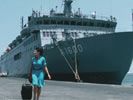Eye For Film >> Movies >> Under The Bombs (2007) Film Review
Too often the news images of violence and suffering in the Middle East depict the civilian victims as a passive, dehumanised mass of grief, lacking any sense of individual personality.
We feel sympathy, but in an abstract, resigned way, perhaps thinking “it will never change” or even worse, that somehow “they’re used to it”. Philippe Aractingi’s powerful, harrowing film offers a welcome antidote to such thinking.

Without being overtly judgmental or political, it makes clear that every death in such circumstances impacts on the victim’s family, friends and community and that no matter how many times a region has suffered tragedy the people living there never become impervious to pain, of any variety.
It opens in August 2006, when Israel responded to rocket attacks from southern Lebanon by Hezbollah militants with a 33-day campaign of airstrikes. On the day a UN-brokered ceasefire comes into effect Zeina (Nada Abou Farhat) a well-heeled Muslim expatriate arrives in Beirut from her new home in Dubai. Her son Karim is staying with his aunt in a village in the south, and she is desperate for transport to take her there.
The war has destroyed all public transport links, and despite the ceasefire, none of the taxi drivers are willing to go into a danger zone. Eventually one of the cabbies, a Lebanese Christian called Tony (Geroges Khabbaz) agrees to take her.
Initially Zeina is disdainful towards her hired chauffeur, and Tony regards the trip merely as a difficult gig for good money. But as they continue their journey through a war-ravaged land they grow to know and respect each other more.
But when they arrive at Zeina’s home village they find the house in ruins. Her sister is dead and though Karim has survived his whereabouts is unknown. Zeina is determined to find him, and Tony is equally determined not to leave her alone...
Shot on location and using largely non-professional performers (apart from the two leads) Aractingi’s film often feels more documentary than drama. It’s not an easy watch by any means but it is a genuine and heartfelt attempt to give a human face to the sufferings of a region blighted by war.
As the film makes clear, Lebanon has suffered such attacks again and again over the years. The film’s title could apply to the victims buried by rubble and the region itself, where homes, communities and lives (Christian and Muslim) are constantly disrupted or cut short by the greater Middle East conflict.
As Tony’s cab drives through a landscape of great natural beauty, but scarred by bomb craters and ruined buildings, where roads often become gaping voids or bridges are useless stumps, it becomes easy to see why the population feel such hatred towards Israel and look to Hezbollah as a symbol of resistance, however one-sided their ‘war’ seems – and however much retribution their actions invite.
But this film is not a hectoring polemic, rather a passionate plea for understanding and empathy. The two leads are terrific. As more details about their lives are revealed (Zeina sent Karim to live with his aunt because of her deteriorating relationship with her husband; Tony has a brother in Israel and dreams of moving to Germany and opening a restaurant with him) you care more and more about them, and about how their journey will end.
The final scenes are downbeat, but the film’s overriding message – of the need to allow a country to be rebuilt in peace and the power of people from differing heritages and backgrounds to find a common humanity – is one of hope. Every one should see it – not out of some sense of ‘right on’ political duty but because it’s a damn fine piece of cinema.
Reviewed on: 05 Mar 2008


















